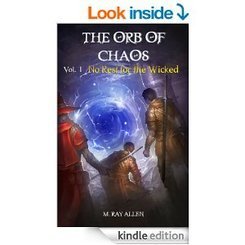Tolstoy had Napoleon and 1812. We've Got Tolkien and World of Warcraft

The Orb of Chaos Vol.1: No Rest for the Wicked by M. Ray Allen
File Size: 2752 KB
Print Length: 558 pages
Page Numbers Source ISBN: 0615874029
Simultaneous Device Usage: Unlimited
Publisher: Lucky Duck Publishing (January 19, 2014)
Sold by: Amazon Digital Services, Inc.
Language: English
ASIN: B00EYRUWDK
I first read the Lord of the Rings in the original "unauthorized" US Ace editions ( the ones that really annoyed J.R.R. Tolkien and inspired him to write his famous note about courtesy to living authors in the early, authorized Ballantine versions of TLOR). It is ironic that the whole kerfuffle was sparked by Tolkien's belief that his epic fantasy would be harmed by appearing in:
“ ‘degenerate a form’ as the paperback book.'”
Ace's book were not pirated edition of the series BTW, as the interpretations of US law at the time seemed to support the position that Tolkien had mishandled his copyrights. (I'm not going to go into this as trying to explain copyright laws and IP licensing gives me the hives. I do have a friend whose legal specialty is IP and I notice that he seems to scratch himself a lot.)
While I don't think he ever appreciated it, those degenerate Ace editions spread Tolkien's fame far and wide among the beatniks, hipsters and flower people of the 50s, 60s and 70s. From there, the series moved up and out and eventually filled his and his family's coffers with enough loot to fill up a reasonably sized room in Smaug's Ereborian pied a terre.
Now, I know I'm going to catch a great deal of heat for this observation, but I think Tolkien overrated himself (I know, I know. I have a lot of nerve. How many mega-best seller have I written? But give me time). I don't think TLOR is great literature. I think it's a very good yarn and a stunning achievement in popular culture as is Dracula and The Wizard of Oz, two other books that don't quite scale the literary peaks high enough to reach that ultimate summit we call "literature."
Perhaps the problem lies in the character of Sauron. We never learn much about him or his personal motivations for wanting to conquer Middle-Earth. When we first “meet” him, he’s faceless and remains so for the length of the trilogy. I’ve always wondered why TLOR didn’t provide Sauron with a richer backstory. Tolkien was, after all, a master of creating detailed, three dimensional imaginary worlds. Perhaps something like the below would have helped:
Dear Mr. and Mrs. Mirkwood,
I’m writing you per our agreement to update you on Little Sauron’s progress at Middle-Earth Elementary School. While everyone is sure your son is a bright and inquisitive child, the current state of his peer interactions remains a concern (though, in his defence, many of the senior staff find Little Sauron enchanting and predict he has a bright future. Still, I must report on what I see).
For instance, today at Lunch Recess, your son attempted to transform several members of the First Grade into Uruk-hai, frightening several of his classmates terribly and even causing one little Elvish girl to wet herself. Little Sauron has also volunteered to take care of the class bunny, something that I initially thought was a hopeful sign, but now I am not so sure. When I went over to Bombadil to check on his well-being, I noticed his incisors were abnormally sharp and he nipped at me. Also, I do not believe bunnies normally salivate much.
Another issue has arisen that must be discussed. As you know, Middle-Earth Elementary School serves a diverse educational audience that includes Humans, Hobbits, Elves, Ents, etc. Recently, your son has taken to shouting out “Hey, Get Shorty” anytime he spies a Dwarvish child, behavior that does not contribute to the atmosphere of tolerance and community we constantly seek to build at this establishment.
On a more positive note, Little Sauron continues to show a positive flair for penmanship, though his practice note pads do have an unfortunate tendency to burst into flames when he has finished with them.
Sincerely,
Miss Fenmarch, Kindergarten Second Class, Middle-Earth Elementary School
I feel this adds a bit of depth and perspective to the story. Or maybe not.
Ah, you ask, which modern books in the genre, or close to it, do I regard as literature? I nominate two. T.H. White's The Once and Future King and Arthur Rex by Thomas Berger (also the author of Little Big Man ). If you haven’t read Arthur Rex , pick up a copy. You are in for a treat). Why are they better than Tolkien? Because they create worlds in which humor and tragedy both exist and intermix, something that Tolkien's work lacks.
Regardless of your particular opinion on Tolkien’s literary ranking, the astounding success of TLOR has provide subsequent authors with a solid template on which literally thousands of novels, novellas and short stories rely on (not to mentions hundreds of game and virtual worlds). If you want to create a fantasy epic, you can pull from a laundry list of different plot elements and characters such as:
Elves, Dwarves, Gremlins, Gnomes, Wizards, Mages, and so on (Hobbits are a Tolkien exclusive).
A quest or quests.
An enchanted kingdom in danger of foreclosure.
An enchanted prince, princess, king, queen, duke, duchess et al in danger of foreclosure.
A dungeon.
An evil wizard.
An evil king.
And evil wizard king.
Someone so incredibly evil they can melt you in your armor.
A sniveling quisling.
And so on.
Grab your chosen ingredients, mix, spin, write your yarn, complete, and begin again.
The Orb of Chaos is a Tolkienesque tale built from the basic template above and fits firmly in that class of fantasy novel I refer to as ”Shaggy Orc.” Exemplars of the genre are Robert Asprin’s Myth series, Craig Gardner’s Wuntvor line and just about anything published by Terry Pratchett. Normally, the “heros” of these stories are nebbishes, ne'er do wells, magical nerds and generally people who are unlikely to be dating on Friday night or borrowing twenty dollars they promise to pay back next week but don’t. Or both.
Orb takes place in the magical realm of, well, actually, I’m not sure. It’s a fairly generic magical realm with knights, elves, goblins, wizards and the other usual suspects. Most of the early action centers around an inn named “The Lucy Duck,” inhabited by two of our protagonists, Soliere Forrester, a rogue suffering from a congenital cash shortage who is catnip to the various serving wenches and members of the lower middle class who inhabit the environs in and around the Duck and Oather, a large Barbarian of unknown origins. Soon to be thrown into the mix is Halistan, a young cleric, Serieve, a paladin in training, and Andrea, a young and beautiful assassin who would just as soon shove a dagger in your ribs as look at you. Let’s not forget Zorath, a querulous wizard.
As the plot moves along, more elements are added to mix, including a sadistic emperor who likes to toy with his employees before dispatching them in various horrible ways (I kind of liked him. He reminds me of Steve Jobs in his heyday), an evil demon king with an attitude and the ability to raise the dead in unholy quantities (I know, that’s redundant, but it’s my review), court schemers, and more characters drawn from the standard stocks.
And yes, there is a dungeon quest, a battle with two kinda-dragon-like creatures, and at the end , an epic battle against an undying army of the skeletal dead. That section was very well done and provides some enjoyable shivers. All the bases are pretty much covered.
Now, the secret to making a book like this work is the characters. They must be interesting and their interactions intriguing enough to freshen up the fairly standardized backdrop on which they perform. Otherwise, it’s pretty much been there, seen that.So, how does Orb do in this respect? Pretty well, especially as the story moves into the latter half. I will say that in the next book of the series, author Allen should mix it up some more and build out the main characters while letting others drop into the background. Also, slightly sharper copy editing is also recommended. (Indies, make sure you get this right and don’t skimp.)
To sum up, a bright, well-written Tolkienesque tale that will keep you entertained for an afternoon. The characters don’t break new ground, but the rogue is roguish, the paladin noble, the assassin winsome and deadly and there’s something going on between her and the cleric and I want to know more.
Published on November 17, 2014 14:35
No comments have been added yet.



